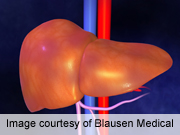- Could Your Grocery Store Meat Be Causing Recurring UTIs?
- Are You Making This Expensive Thermostat Error This Winter?
- Recognizing the Signs of Hypothyroidism
- 10 Strategies to Overcome Insomnia
- Could Artificial Sweeteners Be Aging the Brain Faster?
- Techniques for Soothing Your Nervous System
- Does the Water in Your House Smell Funny? Here’s Why
- Can a Daily Dose of Apple Cider Vinegar Actually Aid Weight Loss?
- 6 Health Beverages That Can Actually Spike Your Blood Sugar
- Treatment Options for Social Anxiety Disorder
Drug Regimen Cures Hepatitis C in Most Liver Transplant Patients in Study


A new drug regimen is producing high cure rates in small groups of liver transplant patients with hepatitis C, researchers report.
The study’s results are a “landmark achievement,” said study first author Dr. Paul Kwo, professor of medicine at the Indiana University School of Medicine, in a university news release.
“Recurrent hepatitis C post-liver transplantation has historically been difficult to treat, and we have considered post-liver transplant patients a special population in need of new treatment strategies,” Kwo said.
“What this study showed is that this special population is no longer special. We can treat them as successfully as if they haven’t had a liver transplant with drugs that are well tolerated and without risk of rejection,” he explained.
Kwo said liver transplantation in the United States is mainly the result of cirrhosis — liver scarring — caused by hepatitis C. Liver transplant patients with the condition face a 20 to 30 percent chance of developing cirrhosis again within five years.
The current standard treatment involves interferon, which usually requires 48 weeks of treatment. This treatment can also lead to problems like organ rejection and a low response rate, according to information provided by Indiana University.
The new treatment, which includes the drugs ABT-450, ombitasvir and dasabuvir (with or without ribavirin), is administered for 24 weeks. Researchers say this regimen’s side effect rate and risk of transplant rejection appears to be much lower than for treatment with interferon.
The new three-drug regimen cured hepatitis C 97 percent of the time in 34 people who’d had a liver transplant, but didn’t have cirrhosis. The cure rate was 96 percent in patients with cirrhosis, the researchers said.
The current study was a phase 2 clinical trial, and the new regimen is still considered investigational, according to the researchers.
The study appears in the Nov. 12 issue of the New England Journal of Medicine.
More information
For more about hepatitis C, try the U.S. Centers for Disease Control and Prevention.
Source: HealthDay
Copyright © 2026 HealthDay. All rights reserved.










